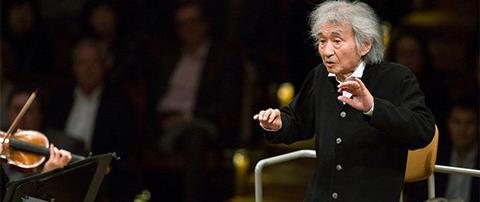The only conductor to have studied with both Karajan and Bernstein, the renowned Japanese conductor died on 6 February 2024, aged 88

Read more news stories here
Japanese conductor Seiji Ozawa died on 6 February 2024, of heart failure at his home in Tokyo. Ozawa had a prolific international conducting career, and was the longest-serving music director of the Boston Symphony Orchestra from 1973 to 2002.
Ozawa was born on 1 September 1935 in Mukden (present day Shenyang, China). He studied piano during his childhood, however, a rugby injury in 1950 caused him to refocus his studies to conducting. He graduated in 1957 from the Toho Gakuen School of Music.
Following his studies, Ozawa won first prize at the International Competition of Orchestra Conductors in Besançon, France. He was invited to attend the Berkshire Music Center (now the Tanglewood Music Center), where he studied with by Charles Munch and Pierre Monteux, and went on to win the centre’s Koussevitsky Prize for outstanding student conductor.
He received a scholarship to study conducting with Herbert von Karajan in West Berlin, where he met Leonard Bernstein. Bernstein appointed Ozawa as assistant conductor of the New York Philharmonic, where he served from 1961 to 1962 and 1964 to 1965.
In Japan, Ozawa had professional engagements with the NHK Symphony Orchestra and the Japan Philharmonic Orchestra. He served as the first music director of the Ravinia Festival from 1964 to 1968, and served as the festival’s principal conductor in 1969. He became music director of the Toronto Symphony Orchestra from 1965 to 1969 and of the San Francisco Symphony from 1970 to 1977.
He became music director of the Boston Symphony Orchestra in 1973 and maintained his tenure for 29 years, making him the longest-serving music director of the orchestra. Following his tenure in Boston, he became the principal conductor of the Vienna State Opera in 2002, a role he held until 2010.
An advocate of cross-cultural exchange, Ozawa became the first Japanese conductor to conduct the Vienna New Year’s Concert in 2002. He founded the Saito Kinen Orchestra in 1992, an all-Japanese orchestra which merges with international artists and performers. He conducted a performance of ‘Ode to Joy’ from Beethoven’s Ninth Symphony at the opening ceremony of the 1998 Winter Olympics in Nagano, which included an international chorus.
Ozawa received numerous awards throughout his career, including being named a Person of Cultural Merit by the Japanese government in 2001, the Suntory Music Award in 2002, Japan’s Order of Culture award in 2008, and the Praemium Imperiale award for lifetime achievement in the arts in 2011. In recent years, he was named a Kennedy Center honoree in 2015 and in 2016 received a Grammy Award for Best Opera Recording, and became an honorary member of the Berlin Philharmonic.
Read: Sentimental Work: Anne Akiko Meyers on traditional Japanese songs
Watch: New trailer for Leonard Bernstein biopic debuts online
Read more news stories here
The number one source for playing and teaching books, guides, CDs, calendars and back issues of the magazine.
In The Best of Technique you’ll discover the top playing tips of the world’s leading string players and teachers. It’s packed full of exercises for students, plus examples from the standard repertoire to show you how to integrate the technique into your playing.
The Strad’s Masterclass series brings together the finest string players with some of the greatest string works ever written. Always one of our most popular sections, Masterclass has been an invaluable aid to aspiring soloists, chamber musicians and string teachers since the 1990s.
American collector David L. Fulton amassed one of the 20th century’s finest collections of stringed instruments. This year’s calendar pays tribute to some of these priceless treasures, including Yehudi Menuhin’s celebrated ‘Lord Wilton’ Guarneri, the Carlo Bergonzi once played by Fritz Kreisler, and four instruments by Antonio Stradivari.













































No comments yet